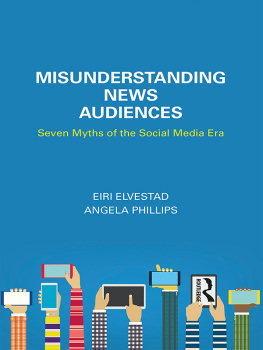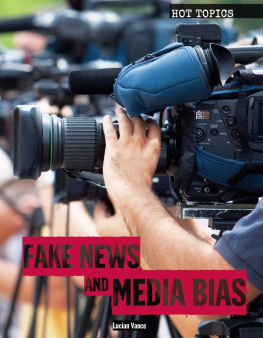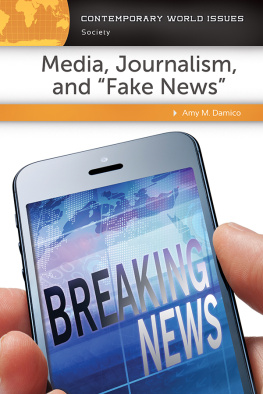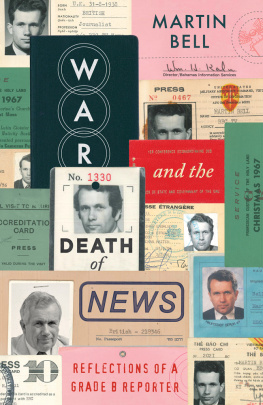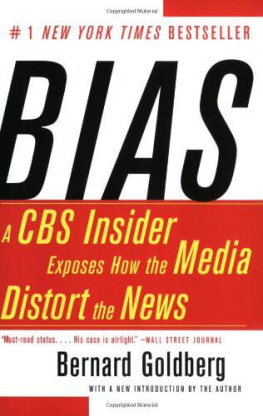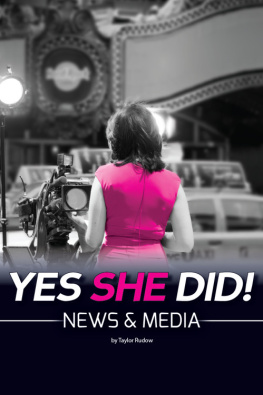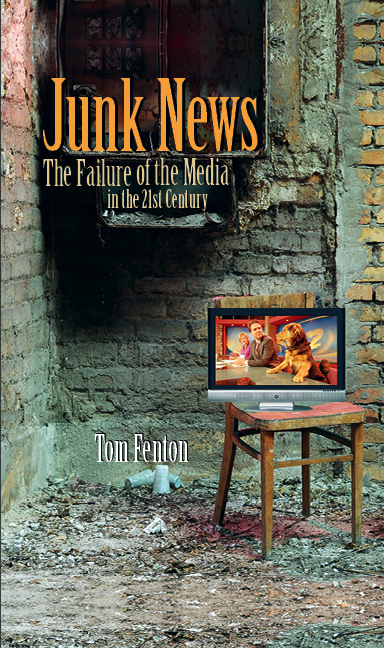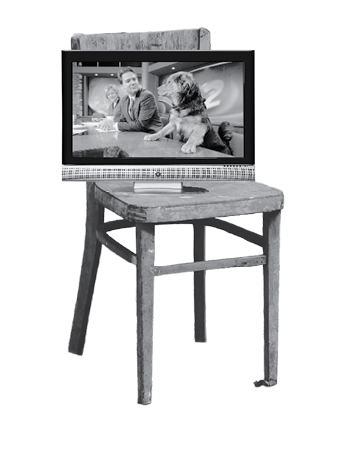SPEAKERS CORNER is a provocative series
designed to stimulate, educate, and foster discussion on
significant topics facing society. Written by experts in a
variety of fields, these brief and engaging books should
be read by anyone interested in the trends and issues
that shape our world.
Junk News
The Failure of the Media in the 21st Century
Tom Fenton
2009 Tom Fenton
All rights reserved. No part of this book may be reproduced, stored in a retrieval system, or transmitted in any form or by any means, electronic, mechanical, photocopying, recording, or otherwise, without written permission from the publisher.
Library of Congress Cataloging-in-Publication Data
Fenton, Tom.
Junk news : the failure of the media in the 21st century / Tom Fenton.
p. cm. -- (Speakers corner)
Includes bibliographical references.
ISBN 978-1-55591-669-5 (hardcover)
1. Press--United States--History--21st century. 2. Broadcast journalism--United States--History--21st century. 3. Journalism--Objectivity--United States--History--21st century. 4. Government and the press--United States--History--21st century. I. Title.
PN4738.F46 2009
071.309051--dc22
2009014559
Printed on recycled paper in Canada by Friesens Corp.
0 9 8 7 6 5 4 3 2 1
Design by Jack Lenzo
Cover collage: General scene Dragan Trifunovic | Shutterstock; Dog in the newsroom Patrick Brown | Alamy; Television
gordana | Shutterstock
Fulcrum Publishing
4690 Table Mountain Drive, Suite 100
Golden, Colorado 80403
800-992-2908 303-277-1623
www.fulcrumbooks.com
O wad some Power the giftie gie us
To see oursels as ithers see us!
It wad frae mony a blunder free us,
An foolish notion
Robert Burns
Blinkered and Blindsided
The Great Crash of 2008 that ushered President Barack Obama into the White House hit Americans like a bombshell. It opened our eyes to the real state of our country. Our bankers had been playing fast and loose with borrowed money, recklessly lending and taking enormous risks that eventually brought down many of the pillars of the financial establishment. Our government had failed to protect usour jobs, our pensions, and the future prospects of our children. And the American news media, which should have seen it coming and sounded the alarm bell, failed to detect the warning signs of the economic tsunami that engulfed us and the rest of the world. We had been blindsided. Our media had lulled us into a false sense of security by feeding us a steady diet of junk news, celebrity gossip, health fads, and fluff rather than the real news we needed to keep us alert and our government on its toes.
As a journalist, I am acutely aware of the failings of my profession, and the fact that the mainstream media have contributed to the publics ignorance and disinterest in economic, government, and international news. As a citizen, I am deeply worried about what that means for America. I have found that roaming the world as a foreign correspondent has given me a clearer view of my country. Distance puts things into perspective. I also notice when I return home that years of living abroad have given me a fresh eye for details that most Americans miss or take for granted. Walking beneath a rusty bridge in Boston, for example, I wonder why the folks back home do not spend more money on maintenance. Dont they notice the state of their crumbling urban infrastructure? And as I look at American society, with all its strengths and weaknesses, I ask myself why my compatriots tolerate inner-city schools that fail to give the urban poor the skills to compete in a modern society. And do they also assume that universal healthcare is an unaffordable luxury? In Western Europe, governments provide full health coverage as a matter of course, just as they provide decent roads and schools.
What worries me most is the blissful ignorance of many Americans about the real state of our country and how it compares with other advanced societies. Americans these days seem to be living in a big cocoon that isolates them from the realities of the world. Most spend their lives in their own space, with a horizon that reaches no farther than the shores of their continent. They do not know how the rest of the world lives and thinks. From time to time, their television programs and newspapers, or the Internet, give them glimpses of the world beyond their shores, but these fragmented reports from abroad have no more impact on their lives than radio waves from a distant galaxy.
Since most of us rarely travel beyond the safe confines of our cocoon, we have little idea of how our governments actions affect the other citizens of our world. We did not fully understand how much America was hated during the George W. Bush years by ordinary people in such places as Palestine and Pakistan. Yet the American public cannot be blamed for knowing so little about the rest of world. There is something fundamentally wrong with the way we gather and disseminate news, with the news media that are supposed to keep us alert, aware, and informed. Our news business is not working the way it should in a healthy democracy. It is sick, broken, and increasingly dysfunctional.
We are paying a steep price for the failures of the media. American journalists sleepwalked into the war in Iraq in the footsteps of the Bush administration. They only woke up when the presidents grand designs came crashing down in the wreckage of the occupation. Too late they reported how our government had squandered lives and money in a failed crusade to remake the Middle East. And thats not all our media missed: at home, it took the chaos of New Orleans and the collapse of a Minneapolis bridge to open our eyes to the dangers of years of underfunding and neglect of our national infrastructure. And today, the media continue to overlook much more that needs to be fixed in our country. The media have failed, and are still failing, to do their duty as the publics watchdogs.
Interestingly, America actually had an official watchdog during both the William J. Clinton and Bush years: David M. Walker, comptroller general of the United States. Most of the public did not know he existed, because the media largely ignored him. In the latter years of the Bush administration, Walker toured America like a modern Cassandra, trying to sound an alarm. He warned of striking similarities between the problems that America faces today and the circumstances that caused the Roman Empire to collapse. His list of dangers included an overconfident and overextended military in foreign lands and fiscal irresponsibility by the central government. Events have since proved that Walker was not a wild-eyed alarmist. He spoke with authority as the head of the Government Accountability Office (the investigative arm of Congress) when he said that America faces unprecedented fiscal risks because of the looming retirement of baby boomers, spiralling healthcare costs, plummeting savings rates and increasing reliance on foreign lenders. Walker tried in vain to stir up a national debate, yet the media paid little
attention to these dire predictions from the governments watchdog. Were they fast asleep?
Its axiomatic that a democratic society needs a vigorous press in order to function properly. It needs journalists who are not afraid to ask the right questions of our elected officials, who can see through government spin, who are not too lazy to dig for their own facts, and who can help frame the public debate. Journalists need editors who will give them the time and resources to do their jobs. And news organizations need corporate bosses who believe they have a duty to the public as well as to stockholders. The utter lack of these essential elements is why I am so alarmed by the state of the American media today.


